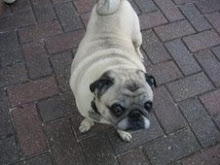 Mom started reading this book last week and while it might not be something I would read, she says that the messages it contains are very powerful and eye opening. Mom has read lots of books on the effects of the standard American diet in the past, but this book reaffirms what she knows in her heart to be true - the lower down on the food chain you eat, the better. Better not just for your health but also for the health of the planet.
Mom started reading this book last week and while it might not be something I would read, she says that the messages it contains are very powerful and eye opening. Mom has read lots of books on the effects of the standard American diet in the past, but this book reaffirms what she knows in her heart to be true - the lower down on the food chain you eat, the better. Better not just for your health but also for the health of the planet.The author, Jeffrey Moussaieff Masson, tells us that this book "raises questions to make us conscious of the decision behind every bite we take: What effect does eating animals have on our land, and even on global warming? What are the results of farming practices on animals and humans?" Have you ever thought about these things before? If not, then you need to read this book. Why? Because we need to educate ourselves about these things before it is too late.
One of the most powerful message comes on the first page of the book. This quote appears as the opening to chapter one and it comes from World Watch magazine:
"The human appetite for animal flesh is a driving force behind virtually every major category of environmental damage now threatening the human future - deforestation, erosion, fresh water scarcity, air and water pollution, climate change, biodiversity loss, social injustice, the destabilization of communities and the spread of disease."
Wow! All these problems from just eating meat. I bet you never even think about what eating meat does to the planet, but this one statement says it all. You probably witness or hear about at least one of these problems every so often in your daily life but you think to yourself it doesn't really affect me. All of these things affect you because what affects one person affects all people.Think about deforestation for a minute. Mom witnessed lots of deforestation in Costa Rica. Huge swaths of rainforest were being clear cut to make way for cattle farms. Cattle = meat. Meat to feed the burgeoning tourist populations that travel to Costa Rica each day. Meat to also feed the ever increase Costa Rican people who want to eat like Americans. How does deforestation in Costa Rica affect you living in the United States? Think about it.
Air and water pollution may not seem like a sexy category but we all need air to breathe and water to drink or we will die. It's as simple as that. While most of the world does not have access to clean drinking water, we pollute ours with factory farm waste - yuk! According to the EPA, factory farm runoff is a greater source of pollution than all other industrial sources combined. This is not good news. In the U.S. alone these animals produce 87,000 pounds of waste every second. This is such a hard figure to get your hands around but ask yourself where this waste ends up. Also, what exactly is in this waste?
Animals are given antibiotics and hormones on a daily basis to keep them free from infection and to help bulk them up. These drugs are in the animals, thus in their waste (not to mention the burgers you eat). This waste pollutes our rivers and lakes killing or injuring the animals that live there. Okay, so? The animals that live in rivers and lakes are food for other animals, so if they are dead or diseased, they are no longer a food source. This domino affect is how our ecosystems work. Each species is dependent on other species for their survival so an absence of one could mean death to many.
It's hard to say which category listed above poses the biggest threat to people around the globe but let's talk about global climate change since it seems like it's always in the news. Cows are a bigger threat to global climate change that automobiles. Eating meat is like driving a huge SUV on steroids. Why? Because methane has 23 times the global warming effect as CO2 and nearly 2/3 of all methane emissions around the world are from agriculture. Cows in particular expelled methane by burping (95%) and farting (5%). If there weren't such an ever increasing demand for meat, there might not be a global climate crisis.
Globally, people are eating more meat than ever before. According to the author, annual per capita meat comsumption in developing countries doubled from 31 pounds in 1980 to 63 pounds in 2002. Why the dramatic increase? And what has this increase done to our climate? I think we witness the effects of this increase each day, but there is still time to make changes.
Okay, enough bad news. What can you do to help? I know that changing to a vegetarian diet is not for everyone and that's okay. I am not a vegetarian because despite what Mom thinks, I need meat. Well, okay maybe I don't need it but I'm old and I can't go vegetarian now. Mom says that if she ever gets another puppy it will be vegetarian from the start. Poor thing.
People are typically vegetarians for one of three reasons: for their health, for the health of animals, or for the health of the planet. That last one is really catching on and that's a good thing. Mom kind of fell into vegetarainism five years ago and has never looked back. She is semi-vegan and she says that she feels much better when she doesn't consume any type of animal products. Switching to a vegetarian diet will do more to fight global climate change than buying a hybrid car.
Lots of people are eating meat free one day a week. This is a great idea! I may even try this because I think I could live without meat for 24 hours since I sleep for about 12 of those hours. Making just this one simple change will have a great impact on the current state of things and it's easier to do than you think. There are lots of meatless options to choose from, just ask Mom. Simply pick a day of the week - Dad has Meatless Mondays - and find foods to eat that don't contain meat. There are tons of pasta, rice, and bean dishes to choose from not to mention soups and pizza. Or how about peanut butter and jelly? I love peanut butter! Maybe I will eat that on my meatless day. The meat-free possibilites are truly endless.
Mom hasn't finished reading this book yet, but she is already inspired to continue spreading the non-meat message. Little changes, baby steps, are all that's needed to change the world. Please educate yourself about where the food you eat comes from and what it does to the planet. This information is vital in sustaining our ever growing population. We can make changes and I know we will. We have to, don't we? Think about it.









4 comments:
Hi Stubby
You are so educated and smart. Did you go to college. What a very interesting post. My mama is a vegetarian, as she cannot even kill a bug. But mommy does eat some meat. But they both get to thinking just about the whole process of what it all entails when a life is- well you know.
You are so smart. Mommy thinks she could go one day without meat- if she can have a whole cheese pizza instead.
Very interesting what you said, and you are RIGHT!
love
tweedles
Hi Tweedles - Thanks for your nice comments. I like to think that I am educated and smart despite not going to doggy college, but I have to thank Mom for all my knowledge because she teaches me everything I need to know.
Since Dad is not a vegetarian it is sometimes hard to get the message across to him. He is kind of living in denial but I continue to tell him the facts.
Mom won't kill bugs either unless she has a tick on her. I could never even hurt a bug because I love all animals.
Stubby xoxo
hi stubby!
oh what an interesting book! emmitt is with stubby and says he likes meat too. my husband fred eats meat as well, but i am more of a vegetable person. :)
that's ok because emmitt loves veggies too so we both get to give him treats.
:) m
Hi Melissa - I knew that Emmitt and I had more in common than our age! Tell Emmitt that I am having his favorite thing for dinner tonight - meatloaf. There's not enough to send some to him in Colorado, but I'm sure he still has leftovers from the party.
Stubby xoxo
Post a Comment